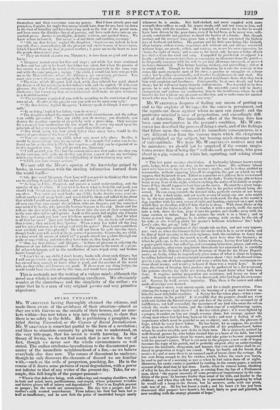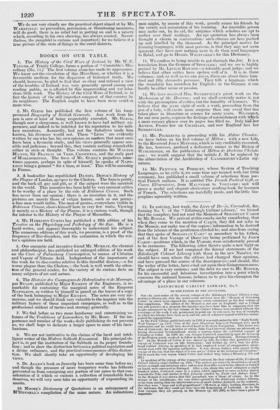SWING UNMASKED.
MR. WAKEFIELD having thoroughly alarmed the citizens, and made them aware of the awfulness of their situation—placed as they are with thieves on the outside of their houses, and no mus- kets within—has now taken a trip into the country, to show that there is no safety in the fields. He is publishing a pamphlet, en- titled Swing Unmasked, or the Causes of Rural Incendiarism. Mr. WAKEFIELD is somewhat partial to the form of a revelation; and likes to stimulate curiosity by giving you to understand, on the very title-page, that his secret is worth knowing. In this theory of Swing, we do not find much that is new in the way of fact, though we never saw the whole circumstances so well stated. The author attributes incendiarism to the discontented pea- santry of the immediate neighbourhood of a fire,—as we believe everybody else does now. The causes of discontent he analyses; though he only discovers the elements of discord we are familiar with,—such as the evils of pauperism, poaching, &c. He in the course of it draws some pictures of rural degradation, with a power not inferior to that of any writer of the present day. Take, for ex- ample, this full-length of the pauper-peasant- " Whatis that defective being, with calliess legs and stooping shoulders, weak in body and mind, inert, pusillanimous, and stupid, whose. premature wrinkles and furtive glance tell of misery and degradation? That is an English peasant or pauper; for the words are synonymous. His sire was a pauper, and his mother's milk wanted nourishment. From infancy his food had been bad as Well as insufficient; and he now feels the pains of unsatisfied hunger .nearly whenever he is awake. But half-clothed, and never supplied with more warmth than suffices to cook his scanty meals, cold and wet come to him, and stay by him, with the weather. He is married, of course; for to this he would have been driven by the poor-laws, even if he had been, as he never was, suffi- ciently comfortable and prudent to dread the burden of a family. But, though instinct and the overseer have given him a wife, he has not tasted the highest joys of husband and father. His partner and his little ones being, like lainiself, often hungry, seldom warm, sometimes sick without aid, and always sorrowful without hope, are greedy, selfish, and vexing; so, to use his own expression, he ' hates the sight of them,' and resorts to his hovel only because a hedge affords less shelter from the wind and rain. Compelled by parish-law to support his family—which means to join them in consuming an allowance from the parish- 111! frequently conspires with his wife to get that allowance increased, or previa t its being diminished. This brings begging, trickery, and quarrelling ; and en ill settled craft. Though he have the inclination, le wants the courage to be- come, like more energetic men of his class, a poacher or smuggler on a large stale ; but he pilfers occasionally, and teaches his children to lie and steal. His subdued and slavish manner towards his great neighbours shows that they treat him with suspicion and harshness. Consequently, he at once dreads and hates them; but he will never harm them by violent means. Too degraded to be des- perate, he is only thoroughly depraved. His miserable career will be short : rheumatism and asthma arc conducting- him to the workhouse, where he will breathe his last without one pleasant recollection, and so make room for another wretch who may live and die in the same way."
Mr. WAKEFIELD despairs of finding any means of putting an end to the exploits of Swing,—for the cause is permanent, and the agents are those against whom no man can guard ; and the particular mischief is easy of perpetration, and exceedingly diffi- cult of detection. The immediate effect of the Swing fires has been some amelioration in the peasant's condition. Mr. WAKE- FIELD has described the process of firing a stack, and of the feelings that follow upon the crime, and its immediate consequences, in a -.-ery different tone from the various tracts which the clergymen have published on the subject, but bearing much stronger marks of verisimilitude. We hope Mr. WAKEFIELD'S motives may not be mistaken: we should not be surprised if the county magis- trates accuse him of being the " well-dressed gentleman, who goes about in a gig, wearing a white hat, squinting, and asking about master."
" This last point requires elucidation. A husbandry labourer knows every path, hedge, bush, post, and dog, on his master's farm. His ordinary labour must take him every day close to his master's stacks; and he is thus enabled to reconnoitre, without exposing 'himself to suspicion, the spot on which we will suppose that he intends to act. Either as a poacher or a pilterer,lie is accustomed to prowl at night, and, like a eat, can see in the dark ; besides being able to leave home at any hour of the night, without exciting the notice of his family or neigh- bours if they should happen to hear Lim on the move. He must he a great bung- ler indeed, unless he can put the tinder-box in his pocket without being ob- served. He can creep towards the devoted ricks, perfectly certain of not being seen, if it be a dark night, and vet nearly as sure of seeing any one who might be in the way accidentally. Arrived at the stack-yard, his dog, or his master's doa-, together with his own senses of sight and hearing, exercised on a spot with which they are familiar, will tell him that he is aloue. With three blows of the flint and steel the tinder is alight : lie touches it with a match, stuffs the match into a rick, shuts the box, pops it into his pocket, and shuffles away with the same caution as before. In five minutes the stack is in a blaze ; and in thrice as much time, perhaps, he is either snoring, wide awake, by the side of his wife, or else bawling under his master's bedroom window= fire ! help; Lord's sake, Sir, get up? help ! time " The supposable variations of this simple tale are few, and not very import- ant : such as, when the labourer lights the stacks which he is set to watch, and by dint of hard swearing to his own vigilance, leads the credulous to fancy that a fire-ball, placed when the wateli Was off, must have done the business ; or when he picks up, in the stack-yard, before witnesses, having first laid it there, a paper partly burnt, but rolled up, and containing brimstone, grease, and soot,— which curiosity, after every magistrate thereabouts has examined it, is carefully forwarded to his Majesty's Principal Secretary of State for the Home Depart- ment ; or, lastly, when he imprudently gives notice of what is about to happen, by tellingbetbreThand a circumstantial Invention about ' two well-dressed stran- gers in a gig, one of whom squinted and wore a white hat, being uncommon cm- rious about master, and want:: ;g to know if there was a watch kept.' In any case, the crime of burning farm produce may be performed by a farm-servant, like genuine charity, the right not letting the left band know what hath been dune. It requires neither preparation nor assistance, and leaves no trace of guilt. Scarcely an incendiary has been discovered, who had kept his own coun- sel. Secrecy, by itself, assures impunity. This, then, is the easiest and safest mode of revenge ever devised. " Revenge is sweet, even among equals, and for a single provocation. Con- sidering the temper of an English serf, the burning of a stack must bestow on him the most delightful emotions. A Swing fire has taken place—what a com- motion ensues in the parish! Is it credible that the paupers should not view with satisfaction the flurried steps and pale face of the rector, the assumed air of indifference, not half concealing the uneasiness of my lord who owns the soil on which the stacks. were burnt, and the violent rage of a neighbouring squire, mixed with nervous indications ? A fire has taken place : if it were lighted by a pauper, it confers on him not simple revenge alone, but revenge against the strong man whose foot had long been on his neck ; and next a feeling, of self- importance which must be grateful to one so abject; and, lastly, the pleasure of hope, which he never knew before. He has burnt, let us suppose, the produce of the farm on which he works. The powerful of his neighbourhood, before whom he used to tremble, now shake in their turn. He is anxiously noticed by well-dressed passers by, who before treated him. as a beast of the field, but who now make kind inquiries about his wants, and take pains to become acquainted with his peasant's nature. What is vet more to the purpose, a new scale of wages becomes the topic of his parish, and is probably adopted, after an understanding between the landlords, clergyman, and tenants, that rent and tithes shall be re- duced in proportion as wages are raised. When his family ask for bread, they receive it ; and at noon there is an unusual smell of bacon about the cottage. He has now firing enough to dry his clothes, which, before the stack was burnt, he used to put on of a morning as wet as when he had taken them off at night- Moreover, his rustic vanity is gratified by reading, in the county paper, a minute account of the deed that he has done. Lastly, When he returns home, thinking of what he has also read in that paper, as coming from the lips of a Parliament man, about the urgent necessity of some permanent improvement an the con- dition of the poor,' he becomes fonder than usual of his wife, and kinder to the children • and when they ask him why, he is prevented from speaking by what he would call a lump in the throat, but he answers, aside, with one great, rude tear of joy. He has but burnt a stack ; and his heart (it has just been discovered that paupers have hearts), his heart, lately so poor and pinched is now swell/II. with the strange pleasure of hope." We do not very clearly see the practical object aimed at by Mr. WAKEFIELD: no prevention, persuasion, or threatening measures, will do good; there is no relief but in putting an end to a misery which, according to his own showing, has always existed. Never- theless, the pamphlet is curious and important; for we believe it a true picture of the state of things in the rural districts.



























 Previous page
Previous page